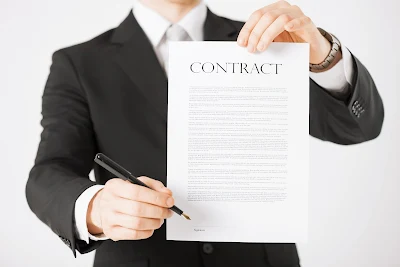 |
| Real estate contract. |
Make an Offer Like a Boss
Ah, the offer!
Know Your Limits |
Learn to Speak "Contract" |
Set Your Price |
Figure Out Your Down Payment |
Make an Earnest Money Deposit |
Review Contingency Plans |
Read the Fine Print |
Make a Date to Settle |
Write a Fan Letter to the Seller |
Brace Yourself for a Counteroffer
Cinematically speaking, this is the iconic moment — we’d forgive you if you imagined, say, putting a hand on your agent’s shoulder and whispering (in your best Vito Corleone) that you’re going to make them an offer they can’t refuse.
In reality, it’s not that simple (or dramatic). Your offer marks the beginning of a {{ start_tip 80 }}back-and-forth between you and the seller,{{ end_tip }} typically with real estate agents advising you both.
The more intentional you are about your offer, the better your chances of making a successful bid. Follow these 10 steps, and you’ll be well prepared — that’s a true story. ("The Godfather" again. We couldn’t resist.)
#1 Know Your Limits
Your agent will help you craft a winning offer. You can trust your agent’s advice on price, contingencies, and other terms of the deal: It’s a mutually beneficial relationship. The more collaborative you are with your agent, the more quickly you’ll be able to move.
But ultimately, it’s you who decides what the offer will be — and you who knows what your financial and lifestyle limits are. Buying a home means mixing strong emotions with business savvy, so now is also a good time to reflect on your “musts.”
- Have a top limit to your offer price because you’re also saving for retirement and love beach vacations? Stick to it.
- Want a vegetable garden or to paint your home’s exterior purple? Make sure your homeowners association rules permit it.
- Besides reading HOA rules, find out how much the HOA has in reserves to cover common area repairs. You don't want to be slapped unexpectedly with a special assessment.
- Want a dog-friendly community? Make sure there are no pet weight limits preventing you from cohabitating with your (extra-large) {{ start_tip 82 }}canine bestie.{{ end_tip }}
#2 Learn to Speak "Contract"
Essentially, an offer is a contract. The documents and wording vary across the country.
In the spirit of due diligence, take time to review sample offer forms before you’ve found a house (
LawDepot.com has purchase agreements for each state). If you’re high-maintenance, a real estate attorney can explain the documents to you so you’re familiar with their vocabulary when you’re ready to pull the trigger on an offer with your agent. Your agent will have offer forms for your state.
Explore More Topics:
Make an Offer & Negotiate
Buy a Home: Step-by-Step
#3 Set Your Price
Homes always have a listing price. Think of it as the seller’s opening bid in your negotiation to buy a home.
As the buyer, your offer will include an offer price. This is the first thing home sellers look at when they receive a bid.
Your agent will help you determine whether the seller’s listing price is fair by running comps (or comparables), a process that involves comparing the house you’re bidding on to similar properties that recently sold in the neighborhood.
Several factors can also affect your bargaining position and offer price. For example, if the home has been sitting on the market for a while, or you’re in a buyer’s market where supply exceeds demand, the seller may be willing to accept an offer that’s below the list price. Or if the seller has already received another offer on the home, that may impact the price you’re willing to offer. Your agent will help you understand the context here.
#4 Figure Out Your Down Payment
To get a mortgage, you have to make a down payment on your loan. For conventional loans (as opposed to government loans), making a 20% down payment enables borrowers to avoid having to pay private mortgage insurance (PMI), a monthly premium that protects the lender in case the borrower defaults on the loan.
But 20% isn’t always feasible — or even necessary. In fact, the
median down payment was 10% in 2017, according to the National Association of REALTORS®. Your lender will help you determine what the best down payment amount is for your finances.
Depending on the type of loan you get, you may even be able to put down as little as 0% on your mortgage.
You might qualify for one of the more than 2,400 down payment assistance programs nationwide. Many of them make funds available to households earning as much as 175% of area median income. In other words, middle-income households. And the savings can be substantial: Home buyers who use down payment assistance programs save an average of $17,766 over the life of their loan,
according to real estate resource RealtyTrac. Find out more about
down payment assistance programs in your state.
You can use an
online mortgage calculator to see how different down payments would affect your mortgage premiums and how much you’ll pay in interest.
#5 Show the Seller You’re Serious: Make a Deposit
An EMD — short for earnest money deposit — is the sum of money you put down as evidence to the seller that you’re serious (read: earnest) about buying the house. If the seller accepts your offer, the earnest money will go toward your down payment at closing. However, if you try to back out of the deal, you might have to forfeit the cash to the seller.
A standard EMD is 1% to 3% of the sales price of the home (so, that would be $2,000 to $6,000 on a $200,000 loan). But depending on how hot the market is where you live, you may want to put down more earnest money to compete with other offers.
In most cases, the title company is responsible for holding the earnest money in an
escrow account. In the event the deal falls through, the title company will disperse the funds appropriately based on the terms of the sales contract. Title companies also check for defects or liens on a seller’s title to make sure it can be transferred cleanly to you.
#6 Review the Contingency Plans
Most real estate offers include contingencies — provisions that must be met before the transaction can go through, or the buyer is entitled to walk away from the deal with their EMD.
For example, if an offer says, “This contract is contingent upon a home inspection,” the buyer has a set number of days after the offer is accepted to do an inspection of the property with a licensed or certified home inspector.
If something is wrong with the house, the buyer can request the seller to make repairs. But most repairs are negotiable; the seller may agree to some, but say no to others. Or the seller can offer a price reduction, or a credit at closing, based on the cost of the repairs. This is where your real estate agent can offer real value and counsel on what you should ask the seller to fix.
Just remember to keep your eye on the big picture. If you and the seller are bickering over a $500 repair to the hardwood floors, keep in mind that’s a drop in the bucket in relation to the size of the bid.
In addition to the aforementioned
home inspection contingency, other common contingencies include:
- A financing contingency, which gives home buyers a specified amount of time to get a loan that will cover the mortgage.
- An appraisal contingency, where a third-party appraiser hired by the lender evaluates the fair-market value of the home to ensure the home is worth enough money to serve as collateral for the value of the mortgage.
- A clear title contingency, where the buyer’s title company verifies that the seller is the sole owner of the property and can legally convey ownership to the buyer.
- A home sale contingency, where the transaction is dependent on the sale of the buyer’s current home.
Although contingencies can offer protection to buyers, they can also make offers less appealing to the seller because they give buyers legal ways to back out of the sale without any financial repercussions. So, if you’re going up against multiple offers, making an offer with fewer contingencies can potentially give you an edge over the competition.
In other words: A chill offer is an attractive offer. But keep in mind you have to be comfortable with the risks that come with this strategy. If you don’t have a financing contingency, for example, and you can’t get a mortgage, you’d likely lose your earnest money deposit since you’re on the hook. (An outcome that’s decidedly un-chill for you.)
#7 Read the Fine Print About the Property
The sales contract states key information about the property, such as the address, tax ID, and the types of utilities: public water or private well, gas or electric heating, and so on. It also includes a section that specifies what personal property and fixtures the seller agrees to leave behind, like appliances, lighting fixtures, and window shades. The seller provides prospective buyers with a list of these items before they submit an offer. This can be another area of negotiation.
Carefully reviewing the property description also helps you know, for example, if the seller plans to take that unattached kitchen island with them when they move. (Stranger things have happened.)
#8 Make a Date to Settle
The sales contract you submit to the seller must include a proposed settlement date, which confirms when the transaction will be finalized. The clock starts as soon as the purchase agreement is signed. If you don’t close on time, the party that’s responsible for the delay may have to pay the other party compensation in the form of “penalty interest” at a predetermined rate.
A 30- to 60-day settlement period is common because it gives the typical home buyer time to complete a title search and obtain mortgage approval, but settlement periods can vary. Some sellers, for example, prefer a longer period so they have more time to move or look for their next house. Being flexible, with respect to the closing date, could give you more negotiating power in another area of the deal.
One thing that’s the same no matter where you live is that you’ll have a three-day period prior to settlement to review the Closing Disclosure, or CD — a five-page form that states your final loan terms and closing costs.
Once the sales contract is signed, the parties can change the settlement date if they both sign an addendum specifying the new day.
#9 Write a Fan Letter to the Seller
Want to make a truly compelling offer? Pull on the seller’s heartstrings by attaching a personal letter to the bid documents. Tell a compelling story about your family and your connection to the area. Get deep about your roots.
Also, sincere flattery can go a long way. Compliment the seller on how their kitchen renovation looks Apartment Therapy–worthy, for instance, or how the succulents in their landscaping remind you of a resort in Palm Springs.
Your agent can help you gather background on the sellers (e.g., are they crazy about their labradoodle, like you are about yours? Did they run a small business from the home, like you dream of doing?). And you should — of course — refer to
information you gleaned during the open house or private showing. Use this intel to write a message that really speaks to the seller, and it may very well seal the deal.
#10 Brace Yourself for a Counteroffer
If you’re making a lowball bid or going up against multiple offers, the seller may decide to make you a counteroffer — a purchase agreement with new terms, such as a higher sales price or fewer contingencies.
At that point, it’s up to you to accept the new contract, make your own counteroffer to the sellers, or walk away.
Don’t panic:
The next part of our guide walks you through the counteroffer process, and it offers strategies to give you more negotiating power.




















